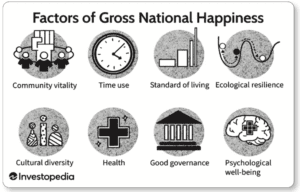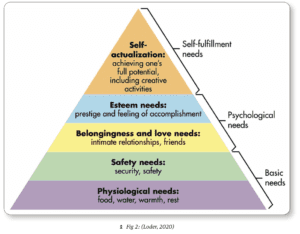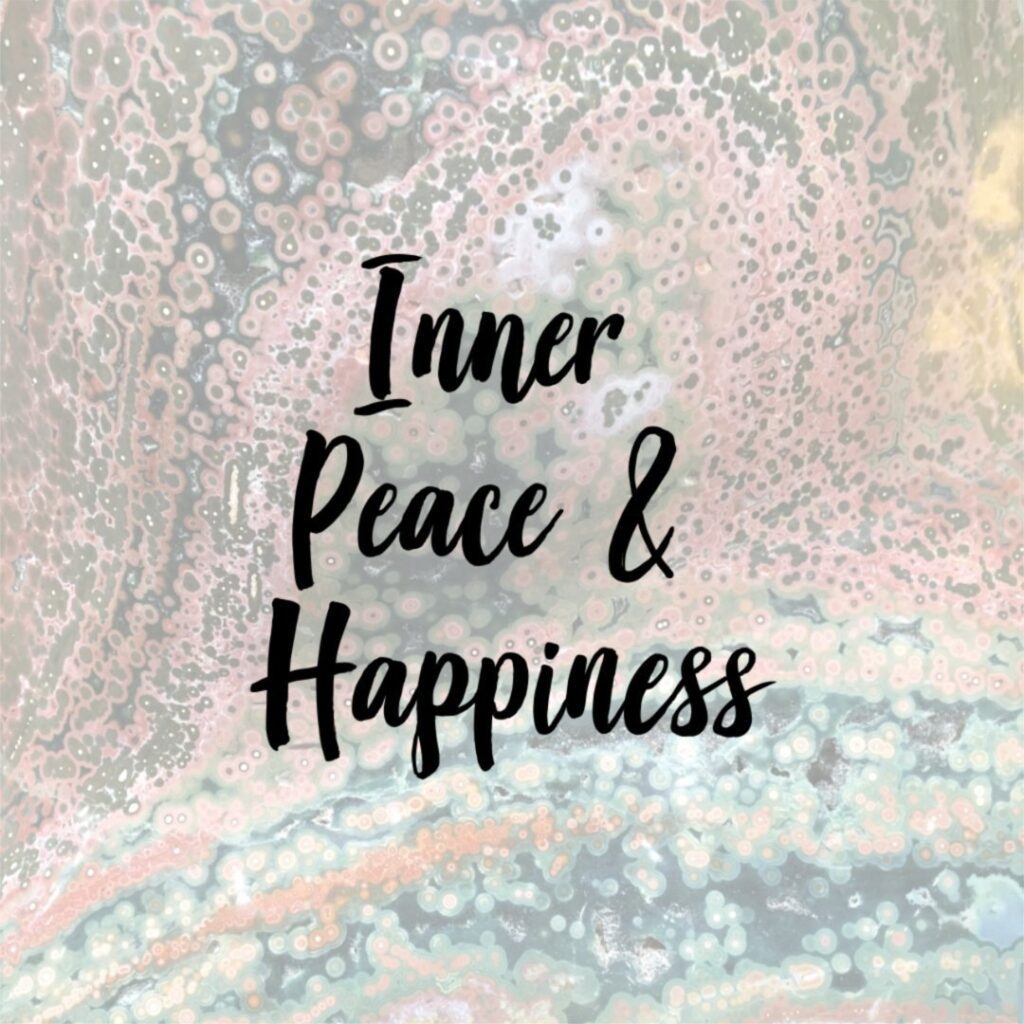Abstract
The coronavirus (covid-19) pandemic has resulted in global societies encountering several changes. This ranges from the lockdown regulations, wearing personal protective equipment and technological progression. Many individuals soon became physically disconnected from family and friends alongside carrying out social activities they enjoyed, providing them with the happiness and zeal to face the challenges in life. This study aims to understand the effects of covid-19 pandemic on inner peace and happiness. The objective is to facilitate individuals towards cultivating inner peace and happiness in the new normal world, through a literature review. Results have revealed that numerous individuals faced loneliness and negative mental health challenges like anxiety and depression where they developed negative emotions, affecting their inner peace and happiness. They have been affected by daily routine disruptions, lack of physical social contact and economic challenges affecting physical and mental health.
Accepting physical change and altering the thought process through the power of the mind, is the first step to cultivating inner peace. The negative energy released into the world from negative information disseminated through media and social media, the struggle for power and accumulation of wealth has impinged upon human inner peace. Recommendations have been made to cultivate sustainable inner peace and happiness through daily meditation practices and continual learning.
Keywords:
Covid-19, Peace, Happiness, New normal
Introduction
The coronavirus (covid-19) pandemic has resulted in global societies encountering several changes. Governing bodies-imposed lockdown regulations to cease spread of the virus, where non- essential businesses and educational institutions were closed (Somani, 2020). Individuals were restricted to their own homes, while key workers supported the nation through their services. Many individuals were made redundant and suffered unemployment contributing towards financial hardships (Somani, Socio- economic Impacts of COVID-19: Facilitating Developing Countries Towards a ‘New normal’, 2021). To minimise the spread of infection, personal protective equipment became mandatory within public places, where individuals had to wear masks and gloves to stay protected.
In addition, to ensure social connectivity and business progression, technology was utilised to a greater degree enabling global connectedness. Many individuals soon became physically disconnected from family and friends, in addition to carrying out social activities that they enjoyed which provided them with the happiness and zeal to face the challenges in life. Global societies faced immense change, which then altered again when we entered a ‘new normal’ world (Somani, IMPROVING BUSINESS ETHICS IN THE NEW NORMAL.2022). Many practices have remained, for example the use of PPE within medical settings, and technological progression through the covid-19 pandemic has created mediums through which individuals can connect with family and friends, despite their residence. When everything occurs the way that individuals expect and like, they are in a comfort zone leading to feelings of happiness and a sense of inner peace.
However, in cases of disruption and unexpected challenges, many individuals feel that their inner peace and happiness have been affected. Inner peace can be defined as “a low-arousal positive emotional state coupled with a sense of balance and stability” (Sasson, 2023). While happiness has different definitions, it is typically defined as “an emotional state characterized by feelings of joy, satisfaction, contentment and fulfilment” (Cherry, 2022). It is linked to positive emotions and life satisfaction. According to the Aristotle the great historic philosopher, happiness is the one desire every human stives to attain, and all other desires are a means to attain happiness. His great philosophy suggests that there are four levels of happiness:
- Immediate gratification from comparison.
- Immediate gratification fromachievement.
- Immediate gratification from making positive contributions.
- Immediate gratification from achieving fulfilment.
Happiness can be attained when a balance is found between excess and deficiency (Kelsey, Axner, Vrooman, & Tse, 2020), however when contemporary challenges like the unprecedented covid-19 pandemic presented itself affecting daily life of humanity globally, inner peace and happiness are affected.
Objectives
This study aims to understand the effects of the covid-19 pandemic on inner peace and happiness. The objective is to facilitate individuals towards cultivating inner peace and happiness in the new normal world, through a literature review.

Fig 1: (Liberto, 2022)
Results and Discussion
Daily routine disruptions
As the covid-19 pandemic created chaos, the daily routine of adults in employment and students attending educational institutions have been disrupted (Somani, Post Covid-19 Effects on the Future of Students in Higher Education, 2021). As governing bodies lifted lockdown restrictions, the world is attempting to reach a new normal. Therefore, numerous individuals have found the transition between working life prior to the pandemic and life in the new normal as challenging, particularly when it comes to productivity levels. This is because individuals that do not reach their goals, do not feel a sense of accomplishment which affects their happiness and inner peace. In many cases, to achieve goals, individuals sacrifice their sleep, health routines like exercising or recreational activities in the attempt to achieve their goals.
There is very little research conducted on the consequences of routine disruptions (McClean, Koopman, Yim, & Klotz, 2020). Daily routines can be disrupted by anything unexpected and simple within the day, therefore it is necessary to be flexible within our daily lives. Routines constitute towards the basic elements of life as they help individuals to conserve the energy which will contribute towards goal attainment during that day. However, when routines are disrupted, surplus energy must be utilised to that would have originally contributed to the daily tasks. Solving disruptions requires conscious thought and energy which contributes towards a less productive day. According to research even when individuals miss one cup of their regular morning coffee, employees commenced their day in a more mentally exhausted manner, and they were less calm than usual.
Due to this, a ripple effect was encountered during their day leading towards being less productive and less engaged. This was same of individuals that did not wake up on time, having their breakfast of challenges commuting to work (McClean S. T., Koopman, Yim, & Klotz, 2020). Human beings do not like change, however nature shows continuous change through the weather and different seasons without being disrupted. Hence, individuals need to learn that flexibility and critical thinking in the face of change is important and should not be factors affecting happiness and inner peace. According to research factors of gross national happiness in figure 1 includes community vitality, time use, standard of living, ecological resilience, cultural diversity, health, good governance and psychological and well-being.
Lack of physical social contact
According to Maslow’s hierarchy of needs, individuals are very motivated to engage in attaining needs that are complex. Hence, upon the fulfilment of basic needs, individuals are driven by their emotional and psychological needs. At the top of Maslow’s hierarchy in figure 2 it is evident that the need for self- actualisation or to achieve one’s full potential is the ultimate goal. It theorises that momentous human experiences and transcendent moments are where individuals feel more happiness, joy and understanding. In contrast at the base of the hierarchy are physiological needs, including the essentials like food, warmth, and rest. Above that are the safety needs which includes security and safety, then comes belongingness and love needs, which include intimate relationships and friends.
Before reaching self- actualisation individuals have esteem needs which include the feeling of prestige and accomplishment. Lack of physical social contact during the pandemic affected the needs of individuals all the way through the hierarchy. Particularly the basic needs and psychological needs due to job loss and redundancies and lack to physical contact. As we reside in a knowledge society, a larger proportion of individuals participated in the acquisition of knowledge through sort-term and long-term online courses. This provided a means through which individuals were able to fill skill-gaps to complete their employment roles efficiently and look for new employment positions (Somani, E-learning in Tomorrow’s Age, 2021).
This has been necessary due to the number of changes that has been made post-pandemic and the technological advancements. Hence, individuals need to ensure that their cognitive needs are fulfilled, so that they are well informed on the decisions they make in their personal or professional lives. Many individuals have recognised the need for beauty and aesthetics, therefore by enjoying music, arts and culture, individuals can achieve happiness. In a world where there is an array of distractions, individuals are curious to seek the true , beyond physical limitations with the aim to fulfil transcendence needs. That can be achieved through the practice of spirituality, helping others, and ensuring connectivity with nature.
Physical and mental health
The covid-19 pandemic has exacerbated negative mental health challenges and created more awareness (Somani, The Impact of COVID-19 on Human Psychology, 2020). All individuals have mental health, however there is good mental health enabling individuals to radiate at a higher vibrational positive energy. When negative mental health challenges emerge, individuals start to emit lower vibrational negative energy. Everything in this world is vibrating at a frequency, and this is the same for our thoughts which start to govern emotions, which consequently we emit into the world. Throughout the covid-19 pandemic individuals have been feeling heightened levels of stress, anxiety, depression, and loneliness.

This has been triggered through social, economic, and political changes and financial instability. The rise in cost-of- living post-pandemic facilitated by the Russia-Ukraine war, has impinged upon physical and mental health of individuals globally. Individuals residing in lower-socio economic areas are more at risk of the spread of infections and diseases due to a lack of infection control, reduced clean water and poor hygiene promoting poor health. In addition, the consequences of poor mental health have been proven to result in physical health challenges. Hence it has been recommended to lower stress levels through regular exercise, eating a healthy diet and drinking the recommended amount of water which will fulfil the basic needs of attaining happiness.
Managing Emotions
When we encounter periods of change there is a tendency for individuals to overthink and over analyse situations. This act affects inner peace and hinders the psychological state of an individual and spiritual calmness, particularly where there are different stressors. When individuals stive to attain peace daily, despite the changes in physical settings, they are happier and content. They are more aware of their thoughts and cease themselves from jumping from one negative thought to another. Most individuals are experiencing negative emotions that have resulted in hurt, they play the events within their minds consistently and think about the words and actions of others. They keep re-living the pain that was experienced through the energy exchange between themselves and the other person.
However, everyone has the ability to generate their own thoughts and feelings should be accountable for the way they feel. Other people do not have the power to change the positive state that someone is in, nor do they have the power to replace them through negative emotions if the individual is emotionally strong. When an individual radiates energy at a high emotional level, and they are stable within their thoughts and feelings, the worldly influences or the negative energy of others cannot shake the individual. Instead, through compassion the individual seeks to understand the actions of another and empathises with them.
They understand that the other individual is hurt, hence feeling the negative emotions and projecting their feelings onto them. When the seeds of negative emotions start to germinate with an individual, it is important to know the route cause and maintain stability through knowing at they are a peaceful being. This includes being tranquil, serene, quiet and pose. According to Chris Shea “The pursuit of inner peace is more important than the search for happiness and success” (Moore, 2019). Many great teachers from Buddha, Mahatma Gandhi and the Dalai Lama believe that inner peace is closely related to happiness and have been advocates of inner peace. Hence within contemporary life, historic teachings can facilitate managing emotions towards finding inner peace and happiness.
Conclusion
Accepting physical change and altering the thought process through the power of the mind, is the first step to cultivating inner peace. The negative energy released into the world from negative information, disseminated through media and social media, the struggle for power and accumulation of wealth has impinged upon human inner peace. Within contemporary life, with the continuous change that we encounter, it is important to be at peace mentally and spiritually. We require appropriate knowledge and understanding to ensure that we are strong and resilient when we face challenges and adversity. Although there is a desire for individuals to reach self-actualisation, there is not a method through which this can be tested.
It is necessary for humans to cultivate peace opposed to harbouring feelings of stress and anxiousness, to attain clarity of thought and progress on the route of happiness. There is a need to be authentic and the covid-19 pandemic has created an opportunity for individuals within global societies to rediscover themselves. This was attainable through the lockdown and an opportunity to continue this into the new normal world. Within an ideal society, individuals can self- actualise and fulfil personal desires on the path to happiness and inner peace. Recommendations have been made to cultivate sustainable inner peace and happiness through daily meditation practices and continual learning. In addition, positive thinking affirmations and gratitude also help individuals lead a more fulfilled and happier life.
References
Cherry, K. (2022, 11 07). What Is Happiness? Retrieved from Very Well Mind: https://www.verywellmind. c o m / w h a t – i s – h a p p i n e s s – 4869755#:~:text=Typically%2C%20 ha ppiness%20is%20an%20 emotional,positive%20emotions%20 and%20life%20satisfaction.
Kelsey, F., Axner, M., Vrooman, K., & Tse, D. (2020). Ideal Levels of Prosocial Involvement in Relation to Momentary Affect and Eudaimonia: Exploring the Golden Mean. Innovation in Aging, 614.
Liberto, D. (2022, 09 24).
Happiness Economics. Retrieved from Investopedia: https://www. in v est opedia. c om/ t erms / h/ happiness-economics.asp
Loder, S. (2020, 03 28).
Your Hierarchy of Needs during coronavirus. Retrieved from Peak Dynamics: http://insights.peak- dynamics .net/ post/102g3b1/ your-hierarchy- of-needs- during- coronavirus
McClean, S. T., Koopman, J., Yim, J., & Klotz, A. C. (2020). Stumbling out of the gate: The energy-based implications of morning routine disruption. Personnel Psychology, 411-448.
McClean, S., Koopman, J., Yim, J., & Klotz, A. C. (2020, 09 17).
How disruptions to our morning routines harm daily productivity, and what we can do about it. Retrieved from LSE: https://blogs.lse.ac.uk/ businessreview/2020/09/17/how- disruptions-to-our-morning-routines- harm-daily-productivity-and-what-
we-can-do-about-it/
Moore, C. (2019, 01 24). How
to Find Inner Peace and Happiness (Incl. Mantras). Retrieved from Positive Psychology: https:// positivepsychology.com/ inner- peace-happiness/#:~:text=Inner%20 peace%20is%20closely%20related, search%20for%20happiness%20 or%20success.%E2%80%9D
Sasson, R. (2023). What Is Inner Peace and How to Find It. Retrieved from Success Consciousness: https:// www.successconsciousness.com/ blog/inner-peace/what-is-inner- peace/
Somani, P. (2020). Our World Before, During and After the COVID-19 Pandemic. LangLit, 29-35.
Somani, P. (2020). The Impact of COVID-19 on Human Psychology. In B. Lal, & N. Patel, Economics of Covid-19 Digital Health Education & Psychology (pp. 328-357). New Delhi: Adhyayan Publishers & Distributors.
Somani, P. (2021). E-learning in Tomorrow’s Age. ARICBEST (pp. 3-10). Oxford: London Institute of Skills Development.
Somani, P. (2021). Post Covid-19 Effects on the Future of Students in Higher Education. International Journal of Social Science And Human Research, 831-834.
Somani, P. (2021). Socio-economic Impacts of COVID-19: Facilitating Developing Countries Towards a ‘New normal’. INTERNATIONAL JOURNAL FOR INNOVATIVE RESEARCH IN MULTIDISCIPLINARY FIELD, 46-53.
Somani, P. (2022). IMPROVING BUSINESS ETHICS IN THE NEW
NORMAL. . International Journal of Social Sciences and Management Review, 182-194.
Dr. Monica Sharma
Senior Rajyoga Meditation Teacher
https://doi.org/10.57259/GRJ703
Bio
Dr. Monica Sharma is a senior Rajyoga meditation teacher who has spent the last thirty years in Gyan, knowledge acquisition. She has a B.com and two doctorate degrees in social services. Dr. Monica Sharma has dedicated the last twenty-one years of her life to social service in Tribal aira Gujarat Chhotaudepur and has achieve multiple awards.
Research Objectives: This study aims to understand the effects of the covid-19 pandemic on inner peace and happiness. The objective is to facilitate individuals towards cultivating inner peace and happiness in the new normal world.


